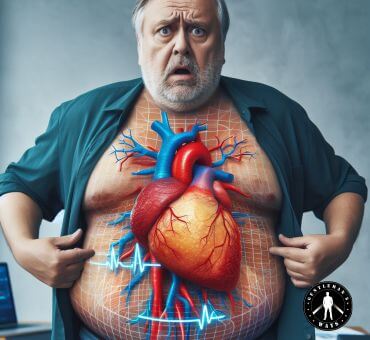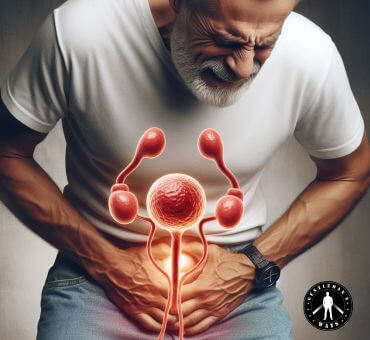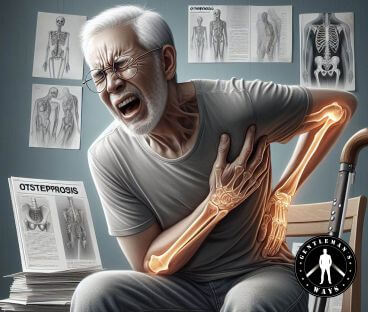Men’s health after 50 is fragile and requires carefulness in diet and general living as there are health considerations that make a man live longer or shorter.
Whether you are approaching 50 or already past it, it is important to be informed about the potential health issues that may arise in your later years.
While you might not be hearing this for the first time, it must be reiterated over and over so you understand how important men’s health from 50 is.
As men age past 50, it becomes increasingly important to prioritize their health and well-being.
With age comes a greater risk of developing certain health conditions, such as heart disease, prostate cancer, and osteoporosis.
Understanding the unique health concerns that men face as they age can help them take proactive steps to maintain their health and quality of life.
In this article, we will discuss key areas of men’s health after 50 and offer guidance on how to maintain optimal health and well-being.
Recommended: 6 Foods Men Should Never Eat
Suggested: Hobbies for Men as From 50
Table of Contents
- Statistics on Common Issues Facing Men’s Health After 50
- Heart Disease/Cardiovascular Health
- Prostrate Health
- Diabetes
- Bone Health
- Mental Health
- Sexual Health
- Frequently Asked Questions
- Final Words from Gentsways
Statistics on Common Issues Facing Men’s Health After 50
Men in their 50s commonly face health issues such as heart disease, high blood pressure, diabetes, obesity, and prostate cancer.
According to research, men’s health after 50 are prone to higher risks of developing heart disease compared to women, with approximately 1 in 4 men experiencing some form of heart disease.
High blood pressure affects around 50% of men in their 50s, increasing their risk of heart attacks and strokes.
Diabetes rates are also higher in this age group, with around 12% of men being diagnosed.
Additionally, around 1 in 3 men in their 50s are classified as obese, putting them at risk for various health complications.
Prostate cancer is another common health issue among men in their 50s, with approximately 1 in 9 men being diagnosed during their lifetime.
These statistics highlight the importance of regular check-ups and healthy lifestyle choices to prevent and manage these health conditions.
Related: Common Fears of Older Men
Heart Disease/Cardiovascular Health

Men’s health after 50 is also characterized by heart disease with changes in physical health needs.
For men over 50, one of the most common health concerns is heart disease.
As you age as a man, your risk of developing cardiovascular issues increases, making it important for you to pay attention to your heart health.
High blood pressure, high cholesterol, and a sedentary lifestyle can all contribute to heart disease, so men over 50 need to maintain a healthy lifestyle to reduce their risk.
Related: 20 Lessons Older Gentlemen Teach
Tips for Avoiding Heart Disease for Men after 50
It is essential to monitor your blood pressure regularly and make lifestyle changes to reduce your risk of developing these conditions.
These include:
1. Regular exercise
Men in their 50s should aim for at least 150 minutes of moderate-intensity exercise per week, such as brisk walking, cycling, or swimming.
Strength training exercises should also be incorporated to maintain muscle mass and bone density.
It’s important to choose activities that they enjoy and vary their routine to prevent boredom and injury.
Recommended: 6 Health Hacks for Men’s Longevity
2. Healthy diet
A balanced diet rich in fruits, vegetables, whole grains, lean proteins, and healthy fats is essential for maintaining physical health.
Men in their 50s should also limit their intake of saturated fats, refined sugars, and processed foods. It’s important to stay hydrated by drinking plenty of water and limiting alcohol consumption.
3. Regular check-ups with healthcare provider
Men in their 50s should schedule regular check-ups with their healthcare provider to monitor blood pressure, cholesterol levels, and other indicators of overall health.
It’s important to address any concerns or symptoms promptly to prevent the development of more serious conditions.
Men should also discuss screening tests for conditions such as prostate cancer and colon cancer with their healthcare provider.
Also Read: What Older Men Look for in Relationships
Prostrate Health

Prostate health is another area men in their 50s should pay close attention to.
When I think about prostate health, it is an emotional one because my dad had this issue and he didn’t pull through.
As men age, the prostate gland can become enlarged, leading to symptoms such as frequent urination, difficulty urinating, and blood in the urine.
In Dad’s case, it blocked his rectum and he couldn’t pass stool and it was a painful experience both for him and us.
It is essential to have regular check-ups with your healthcare provider to monitor the health of your prostate and discuss any concerns you may have.
Recommended: Compression Socks Suitable for Senior Men
Tips for Avoiding Prostrate Disease for Men after 50
- Maintain a healthy diet that is low in saturated fats and high in fruits, vegetables, and whole grains.
- Exercise regularly to maintain a healthy weight and reduce the risk of prostate disease.
- Limit alcohol consumption and avoid smoking, as these can increase the risk of prostate disease.
- Get regular check-ups with your healthcare provider, including prostate screenings as recommended.
- Manage stress levels through relaxation techniques, exercise, and seeking support from friends and family.
- Stay hydrated by drinking plenty of water throughout the day.
- Consider adding prostate-friendly supplements to your daily routine, such as saw palmetto or lycopene.
- Practice safe sex to reduce the risk of sexually transmitted infections that can affect the prostate.
- Stay informed about your family history of prostate disease and discuss any concerns with your healthcare provider.
Suggested: How to Overcome Loneliness as an Older Man
Diabetes

Diabetes is also a significant health concern for men over 50.
As you age, your body becomes less efficient at processing glucose, putting you at risk for developing type 2 diabetes.
Diabetes increases the risk of complications such as heart disease, stroke, kidney disease, and nerve damage.
Poorly managed diabetes can also contribute to erectile dysfunction, vision problems, and slow wound healing.
Tips for Men Over 50 to Avoid Diabetes
- If you have prediabetes or are at risk for diabetes, monitor your blood sugar levels regularly. This can help you track changes and take preventive measures to manage your health effectively.
- Chronic stress can contribute to insulin resistance and increase the risk of diabetes. Practice stress-reducing techniques such as meditation, deep breathing exercises, yoga, or hobbies that you enjoy.
- Prioritize getting enough sleep each night, aiming for 7-9 hours of restful sleep. Poor sleep habits can affect blood sugar control and overall health.
- Moderate alcohol consumption is recommended, as excessive alcohol intake can affect blood sugar levels and contribute to weight gain.
- Smoking is a risk factor for diabetes and other health conditions. Quitting smoking can improve overall health and reduce the risk of developing diabetes-related complications.
Related: Who are the Silver Fox Men?
Bone Health

Bone health is another overlooked aspect of men’s health after 50.
Bone health refers to the strength and density of bones, which is crucial for overall health and mobility.
As people age, especially men over 50, they are at increased risk of developing conditions like osteoporosis, which can lead to bone fractures and other complications.
Maintaining good bone health is vital for men over 50 as the aging process can result in decreased bone density and strength.
Hormonal changes, lower physical activity levels, and inadequate intake of calcium and vitamin D can all contribute to declining bone health in older men.
Related: Fitness and Workout Guide for Senior Men
Tips to Maintain Bone Health for Men Over 50
- Make sure to include plenty of calcium-rich foods in your diet, such as dairy products, leafy greens, and fortified foods. If necessary, consider taking a calcium supplement.
- Vitamin D is essential for calcium absorption and bone health. Spend time outdoors to get natural sunlight, or consider taking a vitamin D supplement.
- Weight-bearing exercises, such as walking, jogging, or weightlifting, can help maintain bone density and strength. Aim for at least 30 minutes of physical activity most days of the week.
- Excessive alcohol consumption can weaken bones and increase the risk of fractures. Limit alcohol to no more than two drinks per day.
- Smoking has been linked to weaker bones and increased risk of fractures. If you smoke, consider quitting to improve your bone health.
- Being overweight or underweight can both impact bone health. Aim for a healthy weight through a balanced diet and regular exercise.
- Of course, regular checkups should be your priority. Regular bone density screenings can help identify any potential issues early on. Speak to your doctor about getting a bone density test if you’re over 50.
- High levels of caffeine and salt can leach calcium from the bones, so try to limit your consumption of these substances.
Recommended: Health Screenings 60s Men
Mental Health

Mental health is often overlooked but is just as important as physical health, especially as men age.
Mental health deterioration in men over 50 can be caused by a combination of biological, psychological, and social factors.
Biological factors such as hormonal changes and declining cortisol levels can contribute to increased stress and anxiety.
In addition, psychological factors like unresolved trauma, loss, or grief can impact mental well-being.
Social factors such as retirement, isolation, and financial difficulties can also play a role.
As men age, they may face unique challenges and pressures that can exacerbate mental health issues.
Tips to Maintain Mental Health
- Regular physical activity can help improve your mental health by reducing stress, anxiety, and depression. Make sure to incorporate exercise into your routine, whether it’s going for a walk, working out at the gym, or playing a sport.
- Maintaining strong relationships with friends, family, and loved ones can help provide a support system for your mental health.
- If you’re struggling with your mental health, don’t be afraid to seek help from a professional.
- Incorporate mindfulness practices into your daily routine, such as meditation, deep breathing exercises, or yoga.
- Take time to care for yourself by engaging in activities that bring you joy and relaxation. This could be anything from reading a book, taking a bath, or pursuing a hobby.
- Eating a nutritious diet, getting enough sleep, and avoiding excessive alcohol and substance use can all contribute to better mental health. Make sure to prioritize your overall health and well-being.
Sexual Health

Men’s health after 50 also takes another turn in sexual health.
Men in their 50s may start to experience changes in their sexual function.
This can include a decrease in libido, slower arousal, and difficulties achieving or maintaining an erection.
These changes are often a result of hormonal shifts, decreased blood flow to the genitals, and other age-related factors.
Strategies for maintaining sexual health
- Open and honest communication with a partner is essential for maintaining a healthy sexual relationship. Discussing any concerns or changes in sexual function can help address any issues and find solutions together.
- Maintaining a healthy lifestyle can help support sexual health in men in their 50s. This can include regular exercise, a balanced diet, adequate sleep, and managing stress.
- For men experiencing erectile dysfunction, there are medical treatments available that can help improve sexual function. This can include medications like Sildenafil or Cialis, penile implants, or other therapies prescribed by a healthcare provider.
Frequently Asked Questions
What happens to a man’s body at 50?
At 50, a man’s metabolism slows down, muscle mass decreases, hormone levels change, and the risk of health issues like heart disease increases.
How do you take care of your health after 50?
To take care of health after 50, prioritize regular exercise, a balanced diet, routine health check-ups, managing stress, staying hydrated, and getting enough sleep.
What is the best food to eat after 50?
The best foods to eat after 50 are fruits, vegetables, whole grains, lean proteins, healthy fats, and plenty of water to support overall health and well-being.
What to expect when you turn 50 years old?
When turning 50, expect changes in physical appearance, energy levels, metabolism, eyesight, memory, and overall health, requiring more attention to self-care and preventative health measures.
Final Words from Gentsways
Men’s health after 50 becomes delicate and should be handled with utmost care and self-awareness.
Taking care of your health after 50 is essential for a long and fulfilling life.
By being informed about the potential health concerns that may arise as you age and taking proactive steps to manage your health, you can reduce your risk of developing chronic conditions and maintain a high quality of life.
Remember to prioritize your physical and mental well-being, maintain a healthy weight, and stay up-to-date on screenings and check-ups to ensure you are on the path to optimal health after 50.
References:
- https://everestmenshealth.com/mens-health-after-50/
- https://www.osfhealthcare.org/blog/6-health-tips-for-men-over-50/
- https://www.aarp.org/health/healthy-living/info-2023/men-turning-50-health-changes.html
- https://www.texashealth.org/areyouawellbeing/Mens-Health/Lifestyle-Tips-for-Men-over-50
Pyo Merez is a men’s lifestyle enthusiast and writer about the gentleman’s place and impact on society. Raised by a distinguished gentleman dad, he offers unique insights into how the mind of a gentleman works and how societal norms shape gentlemen’s identity and vice versa.
Through his insightful articles, Pyo taps into the depths of gentleman culture to provide perspectives on etiquette and manners in modern society.

